News
Online Presentation at Anniversary Celebration
Online Presentation by Gabriele Langer at the Anniversary Celebration of the Corpus-Project of the Korean Sign Language
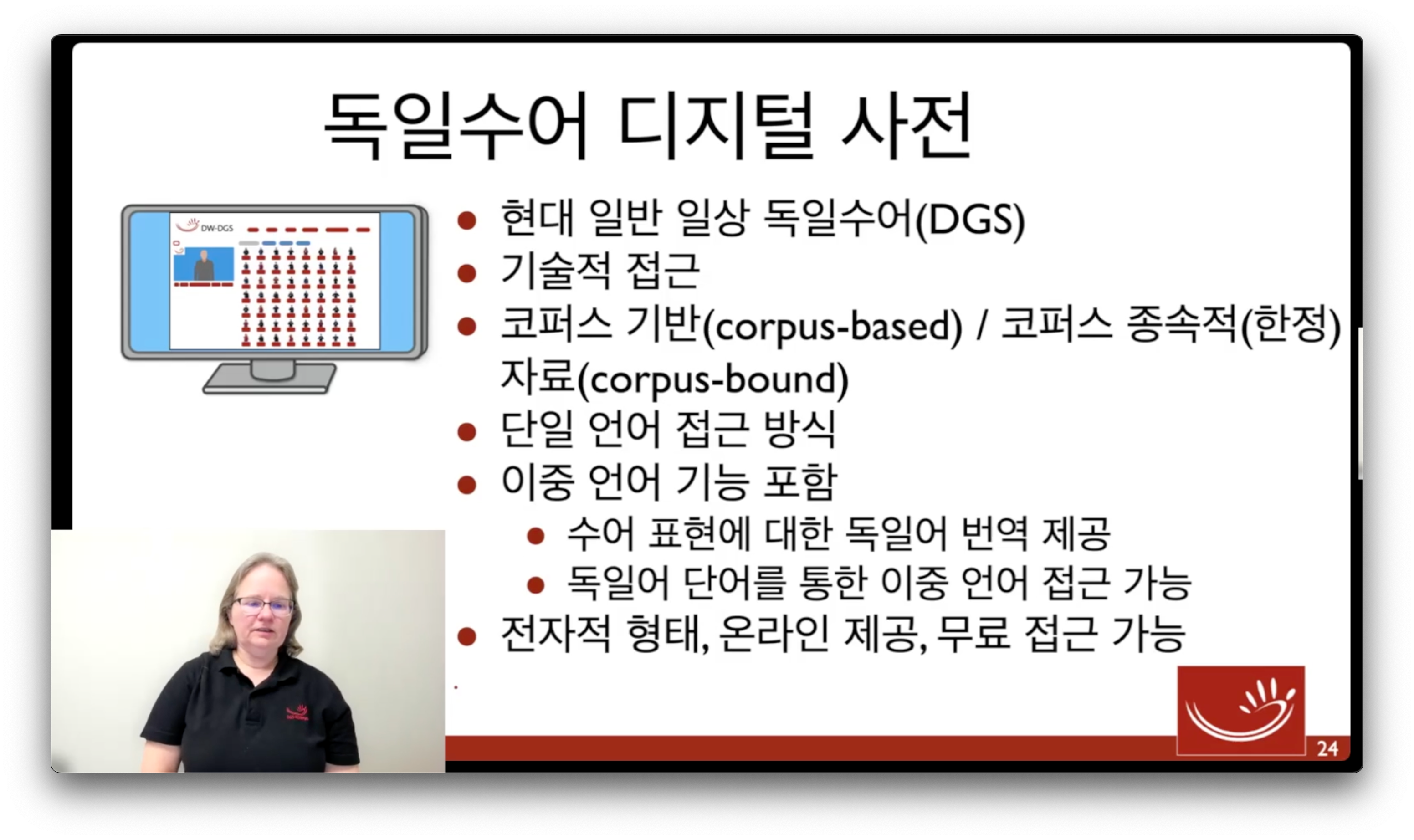
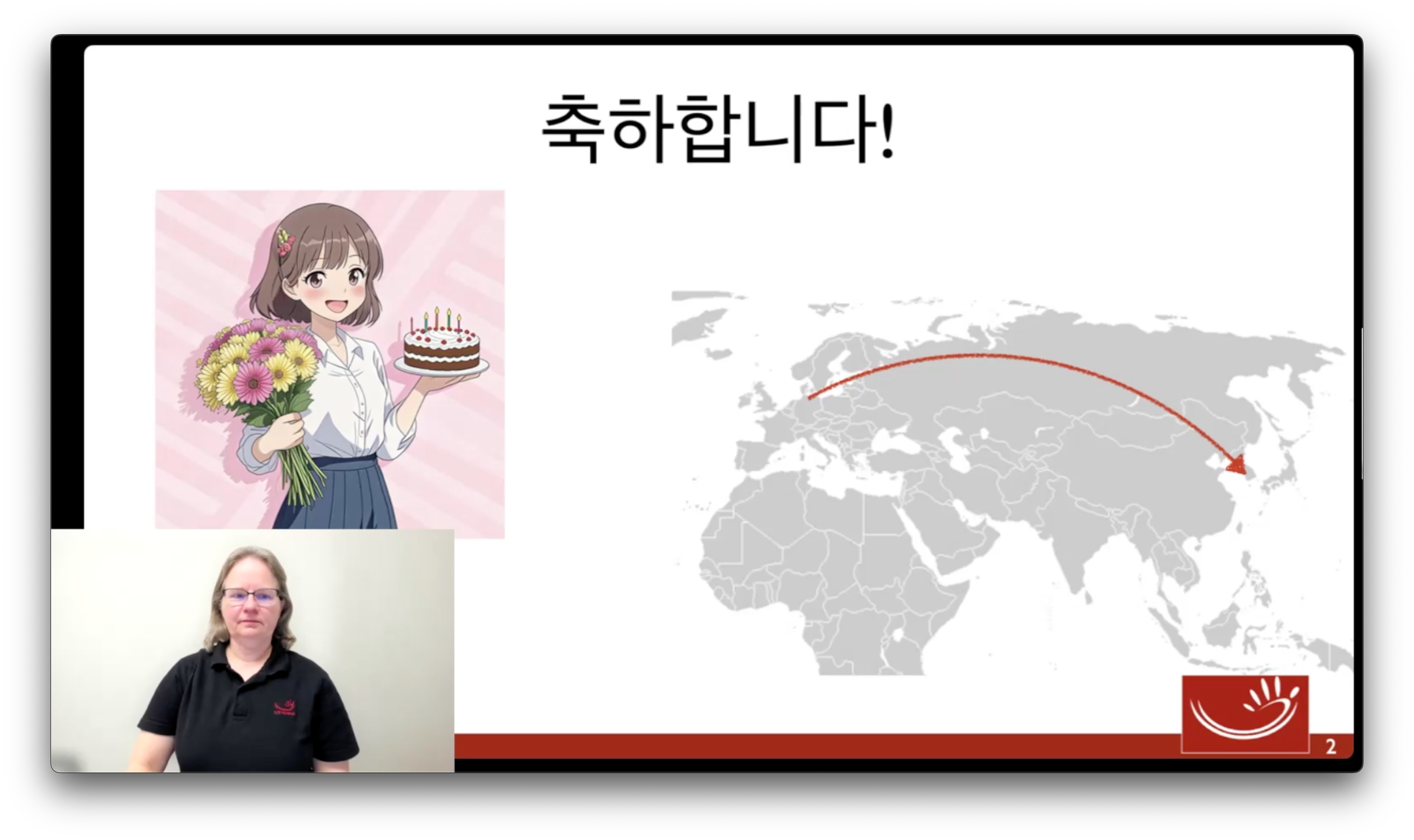
On September 26th 2025, the Korean Sign Language Corpus-Project celebrated its 10th anniversary. Gabriele Langer gave an online lecture on the DGS-Korpus Project at the anniversary seminar. She presented the various websites of the project and the Digital Dictionary in more detail.
Workshop in Berlin
Workshop on Sign Language Translation and Avatar Technology in Berlin
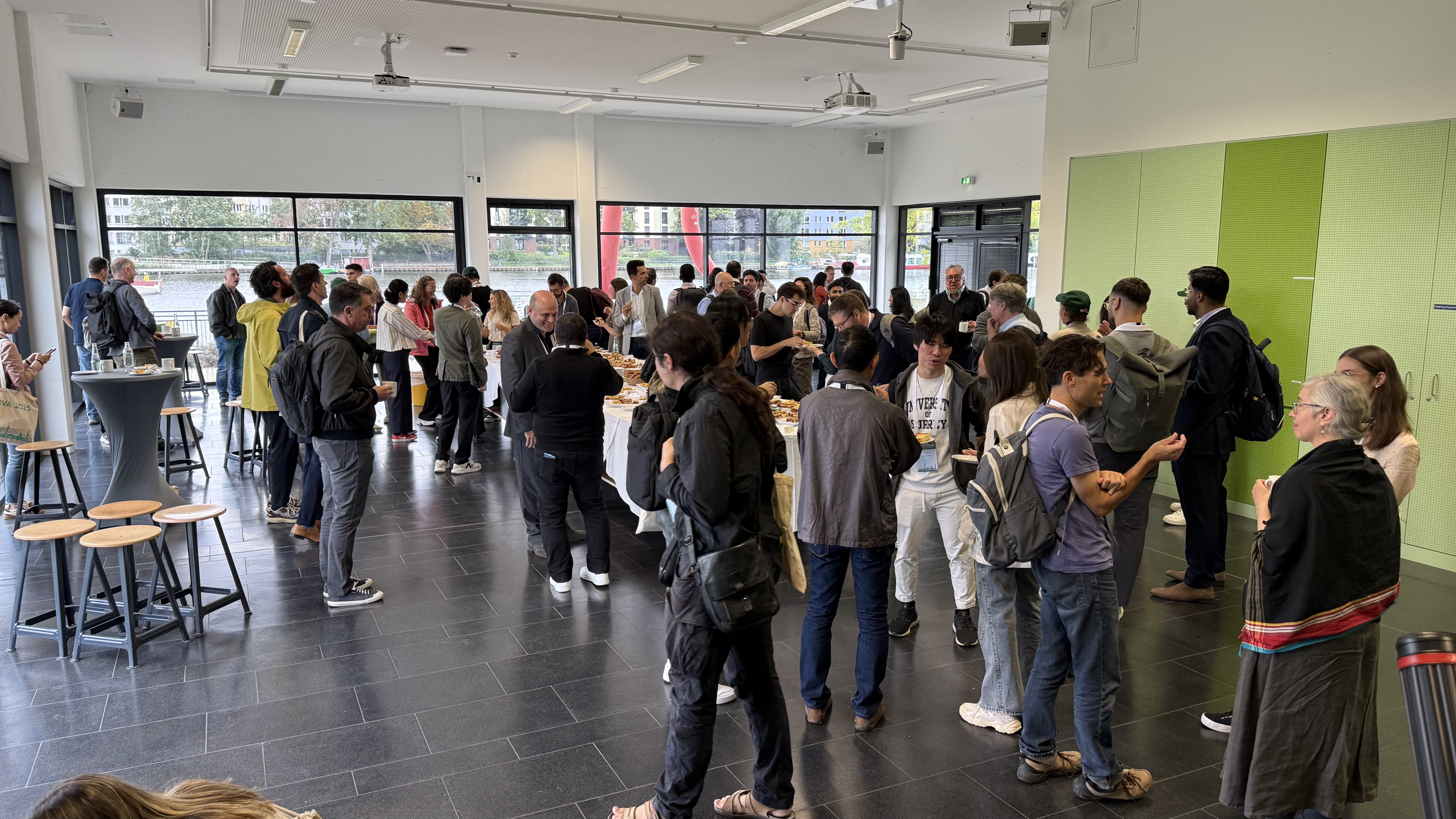
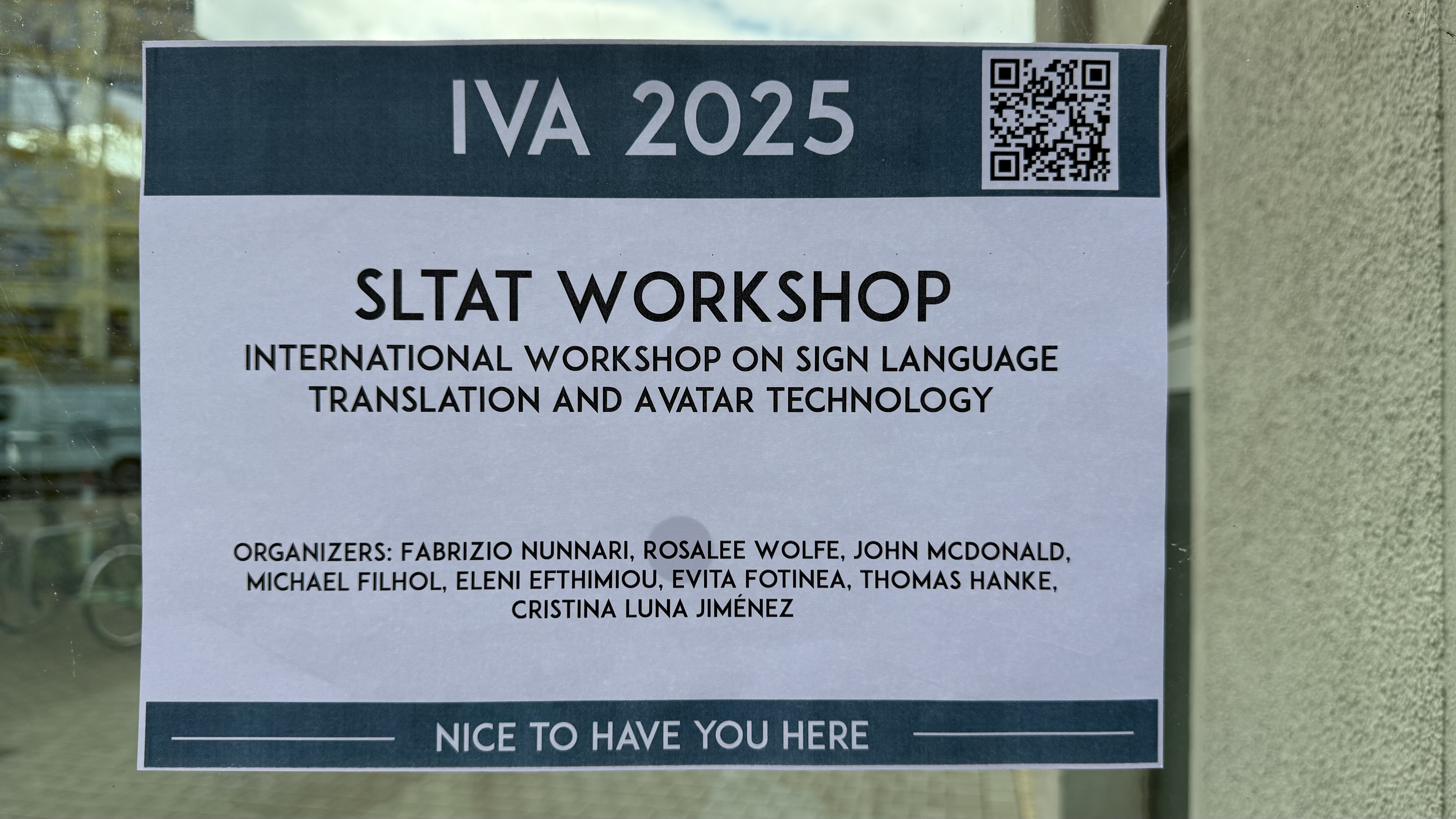
On September 16th 2025, several colleagues from the DGS Corpus Project and the Institute for German Sign Language and Deaf Communication attended the SLTAT workshop in Berlin. Here, they had the opportunity to exchange ideas with researchers from around the world about avatar technologies in connection with sign language translation. This topic is the subject of controversial discussions, especially in the field of sign language research.
Posterpresentation in Italy
Marc Schulder Presents Poster at the Conference on Language, Data and Knowledge 2025 in Naples
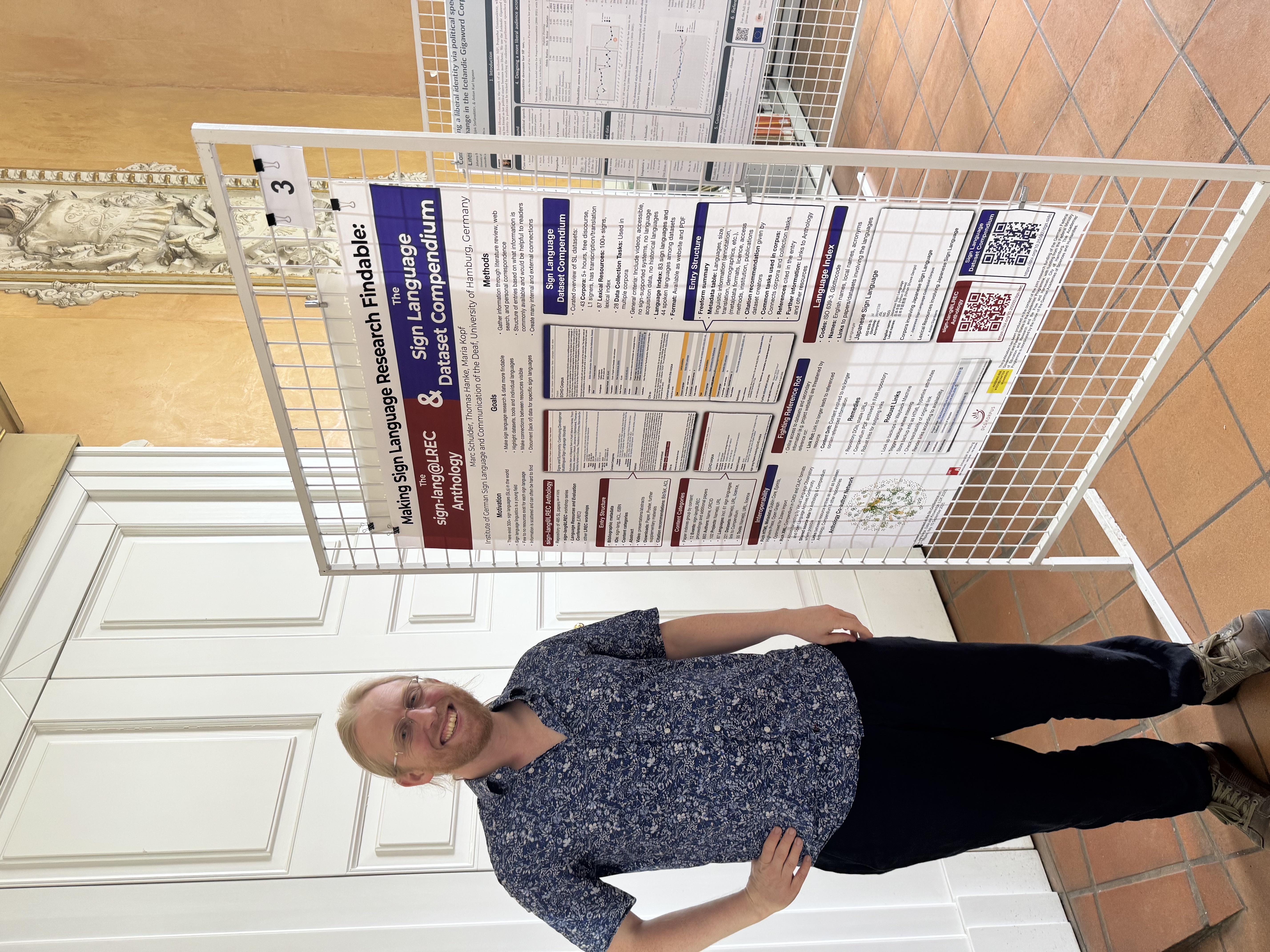

From September 9th to 11th 2025, the LDK 2025 took place in Naples. There, Marc Schulder presented a poster showcasing two websites designed to make sign language research easier to find. The Sign Language Dataset Compendium provides an overview of existing research data, and the sign-lang@LREC Anthology helps users search for relevant publications.
DGS-Korpus at the Elbschule
Presentation and Workshop by Julian Bleicken
As part of the EW-Transfer project “DGS as a language of education”, Julian Bleicken gave a lecture at the Elbschule on June 13, 2025, followed by a workshop. Julian gave an outlook on the upcoming release 4 of “MEINE-DGS” and “MEINE-DGS-annotated” - and presented the differences and possibilities of the new version. The applicability of DW-DGS in the classroom was then tried out and discussed in a workshop. All in all, it was a good opportunity to present the DGS corpus project and its advantages for use in everyday school life.
Lecture and Poster Presentation on Reference Expressions in DGS
Felicitas Otte and Anne Wienholz at the RED in Graz
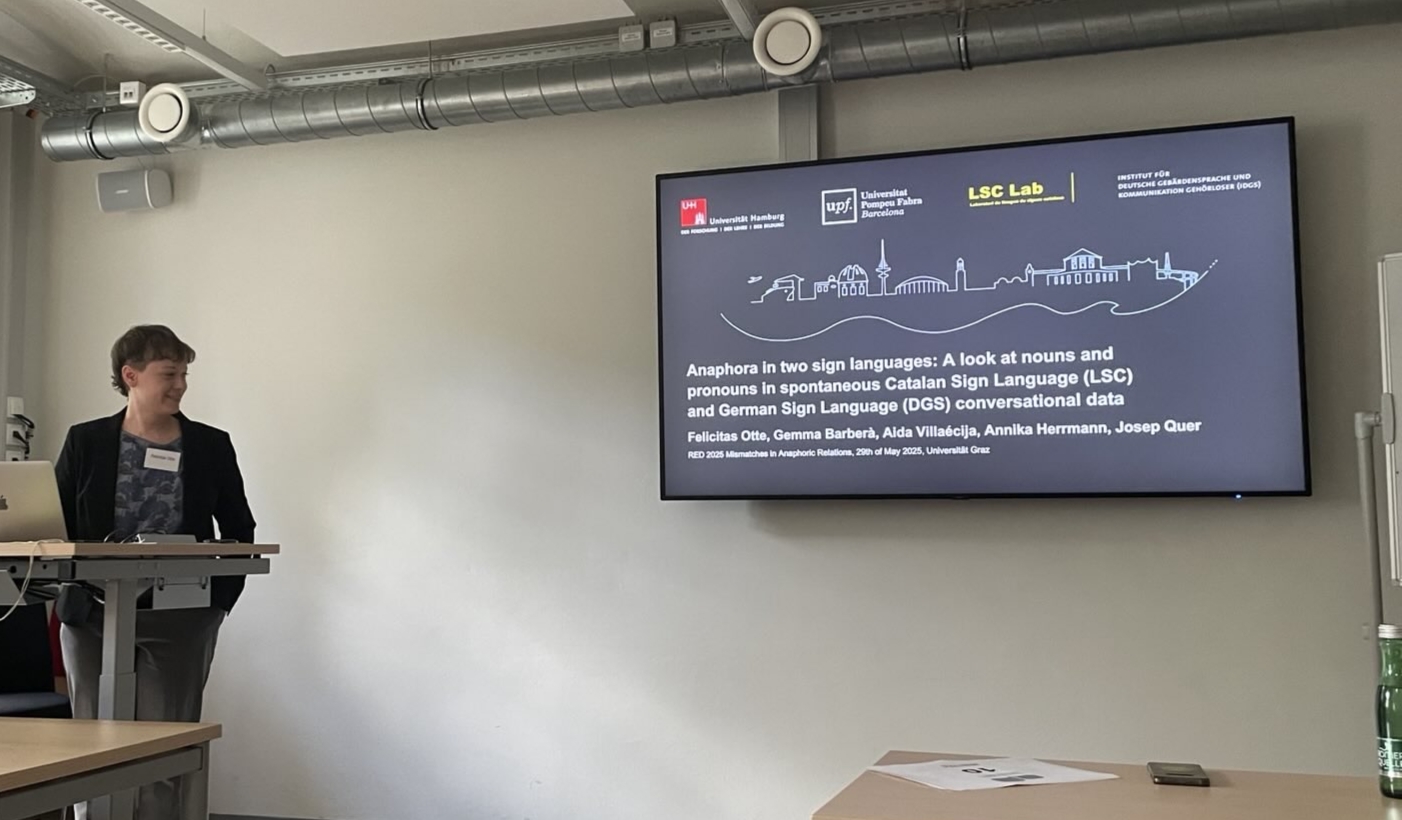
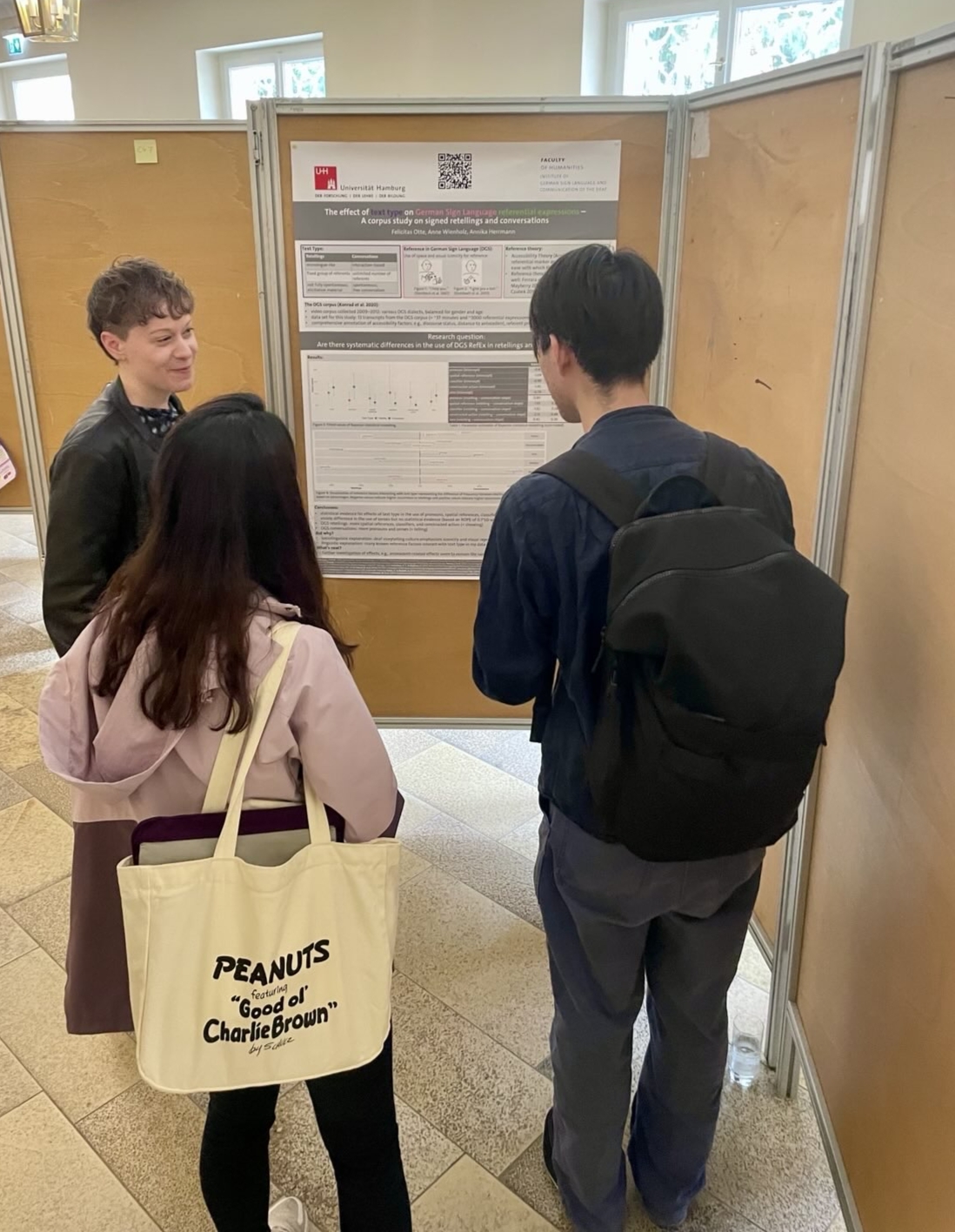
On May 29 and 30, 2025, a conference on reference expressions in different languages took place in Graz, Austria. Felicitas Otte presented a poster with Anne Wienholz and Annika Herrmann on part of her doctoral thesis on the use of reference expressions in DGS, based on DGS corpus data. She also gave a presentation at the conference, in which she presented a comparative study between DGS and Catalan Sign Language. A brief insight into her doctoral project in DGS can be found here.
Online Presentation on Name Signs
Maria Kopf at the yearly convention of the American Name Society
On February 22, 2025, Maria Kopf gave a presentation at the annual meeting of the American Name Society. The meeting took place online. Maria Kopf presented part of her doctoral thesis there. In the talk, she reported on how many name signs the participants have in the corpus, when and from whom they receive them and whether there are also name changes.


DGS-Korpus Team at the 7th Cultural Days of the Deaf in Friedrichshafen 2024
The DGS-Korpus project had its own booth at the 7th Cultural Days of the Deaf in Friedrichshafen. Visitors were very interested and many took the opportunity to have the DW-DGS explained to them. In addition, recordings for a survey on the topic of sign names were conducted at the booth. The days were characterized by valuable encounters, enriching exchanges and the diverse cultural program. We are delighted that we were able to take part in this event.




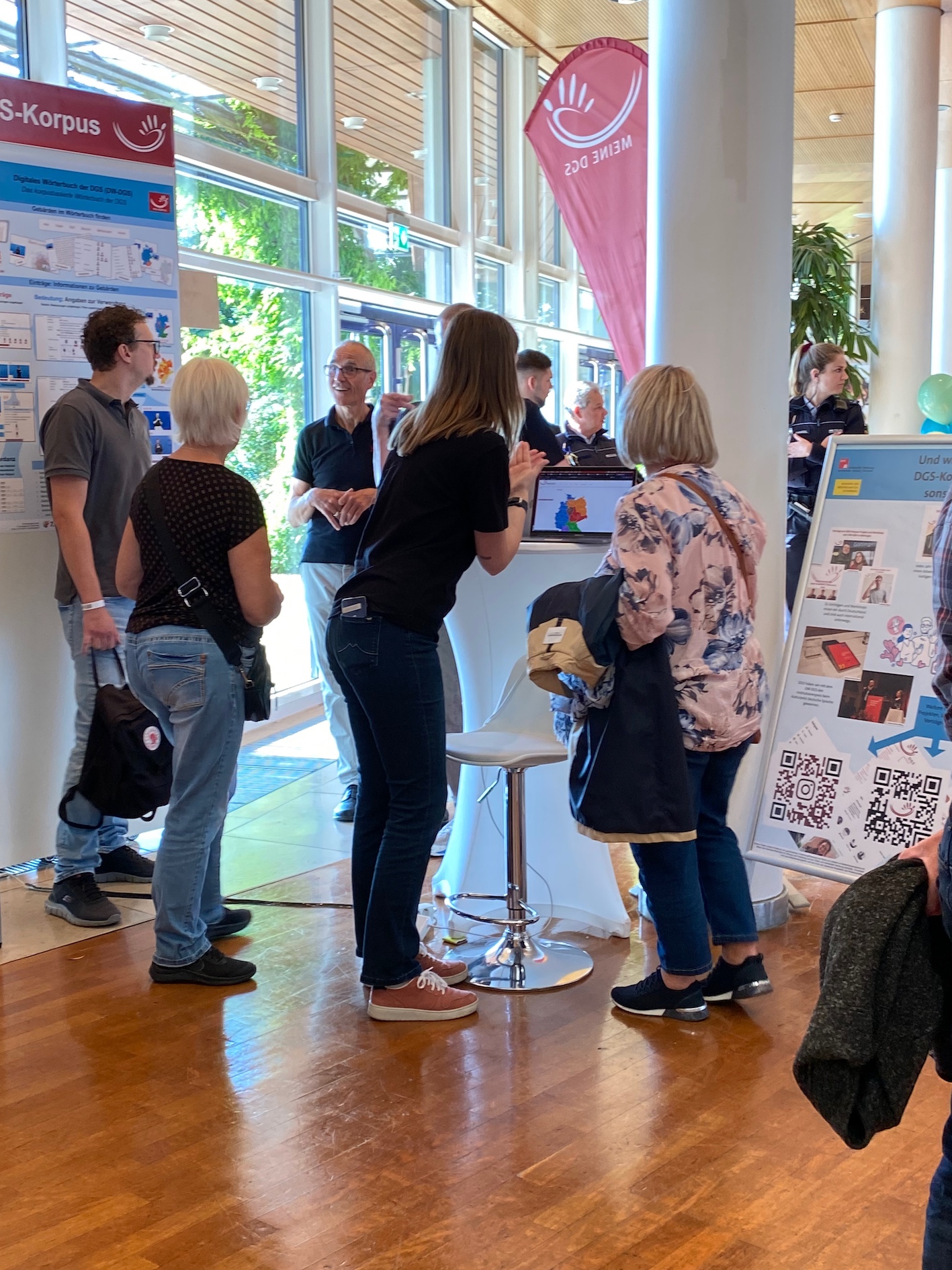


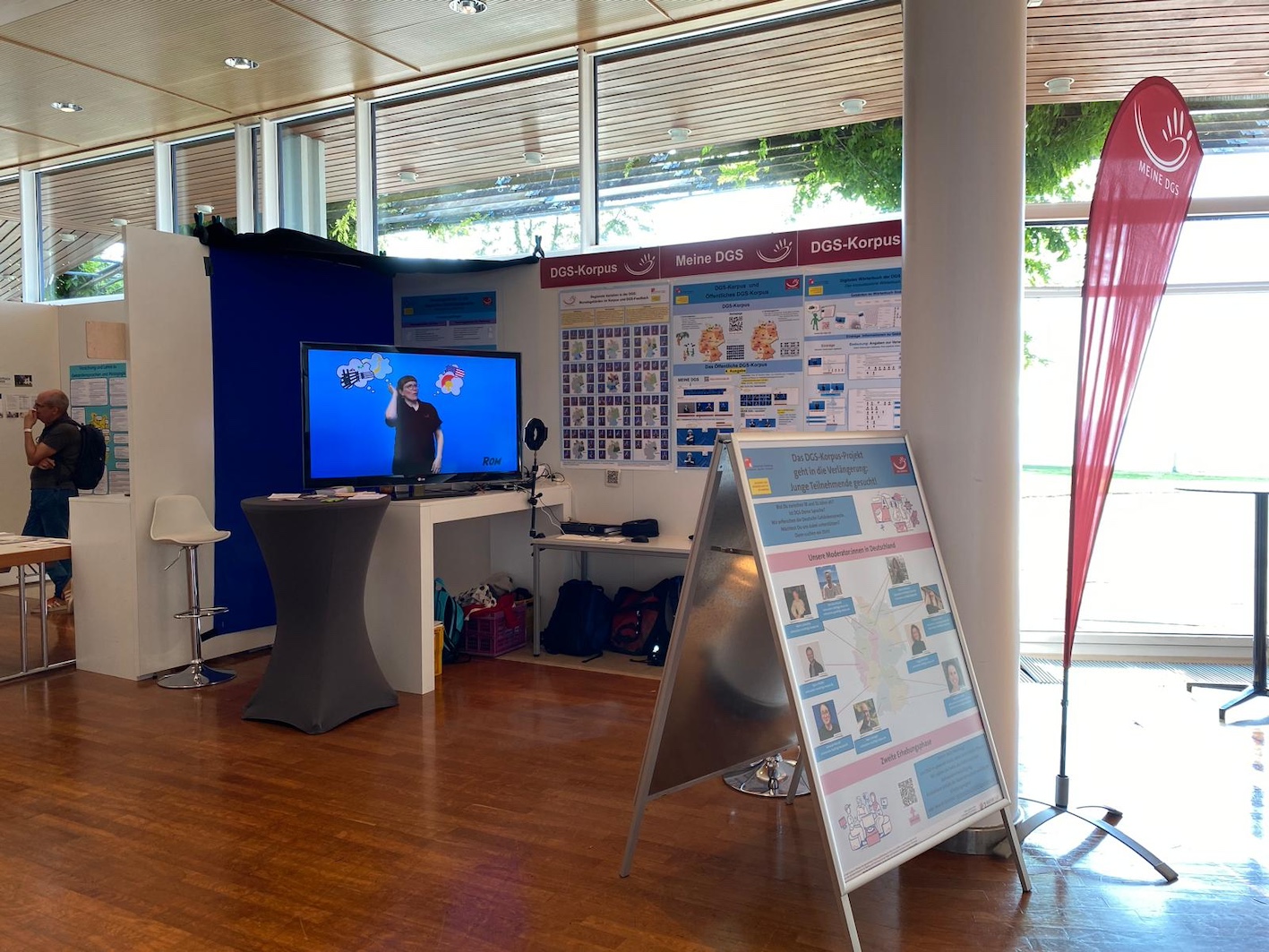
Joint picnic in Planten un Blomen
Picnic in the park
On July 10, 2024, we once again took advantage of our location right next to Planten un Blomen and organized a picnic with students from the DGS-Korpus project. Everyone chatted and laughed a lot and also showed full commitment in the Kubb game. The weather played along and so we would like to say a big thank you to our students, without whom the project would not be what it is. Thank you.
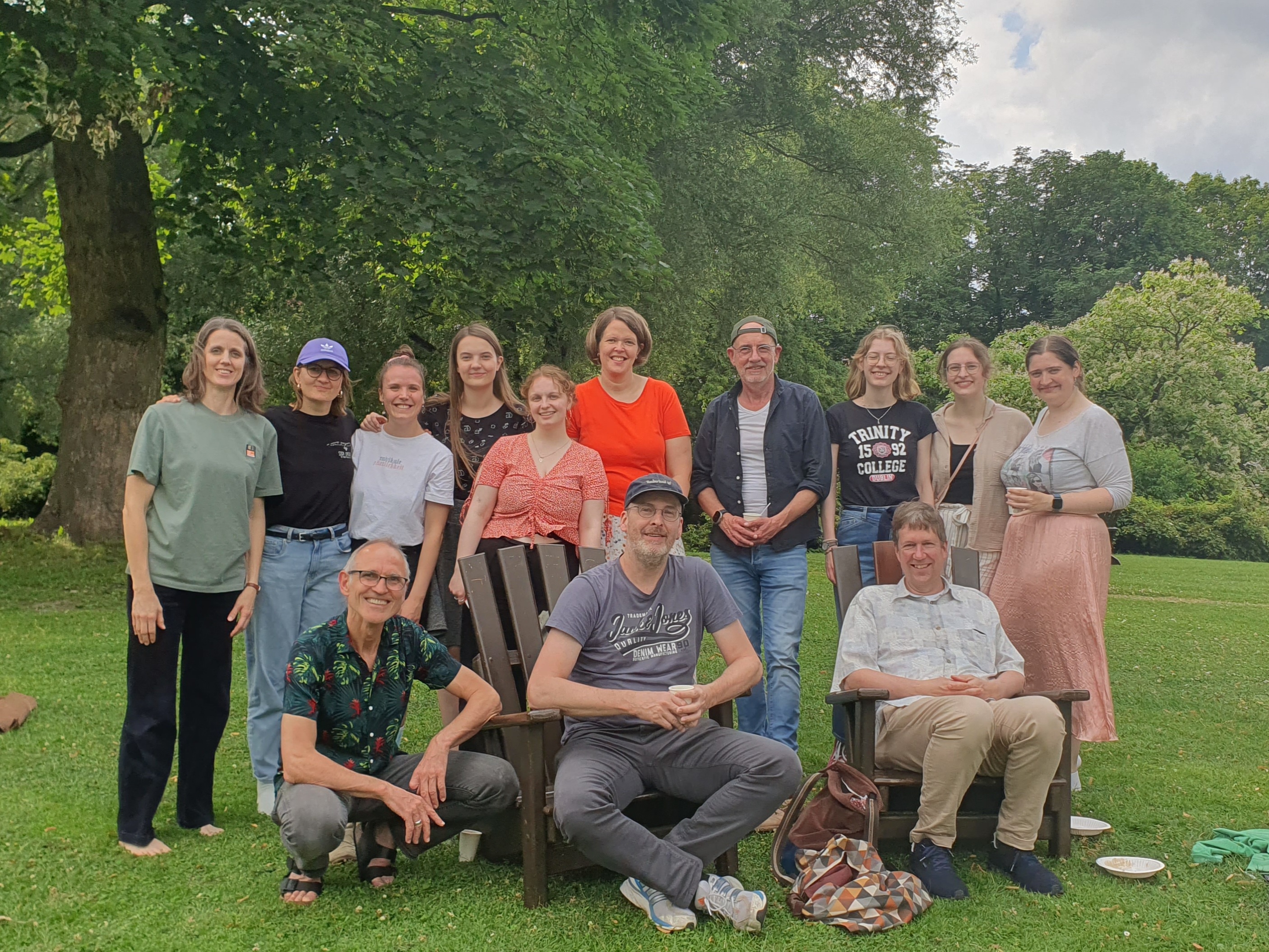
Our Moderator Team for the Second Data Collection is Complete!
We are pleased to announce that our team of moderators is now complete and all have already attended their first training session. The team consists of 9 dedicated deaf young people who come from all over Germany and are preparing to accompany the new participants. In order to get to know the institute and optimally prepare themselves for their tasks, the facilitators were divided into two groups:
Group 1
Deborah Monzel, Nico Schwager, Björn Pfeiffer, Georgina Schneid and Philipp Hergert visited our institute on April 13 and 14. On these days, they not only got to know our team and the premises, but also took part in training sessions to prepare them for their role as moderators.
Group 2
Sheila Schlechter, Peggy Steinbach, Nino Burchhardt and Adelina Worseck were with us on June 1 and 2. This group also took part in the training with great commitment and interest in order to be well prepared for the tasks ahead.
Our moderators are now ready to welcome the new participants with a great deal of expertise and enthusiasm and to support them during their time with us. We are looking forward to an exciting and successful collaboration with our new moderator team and welcome everyone!
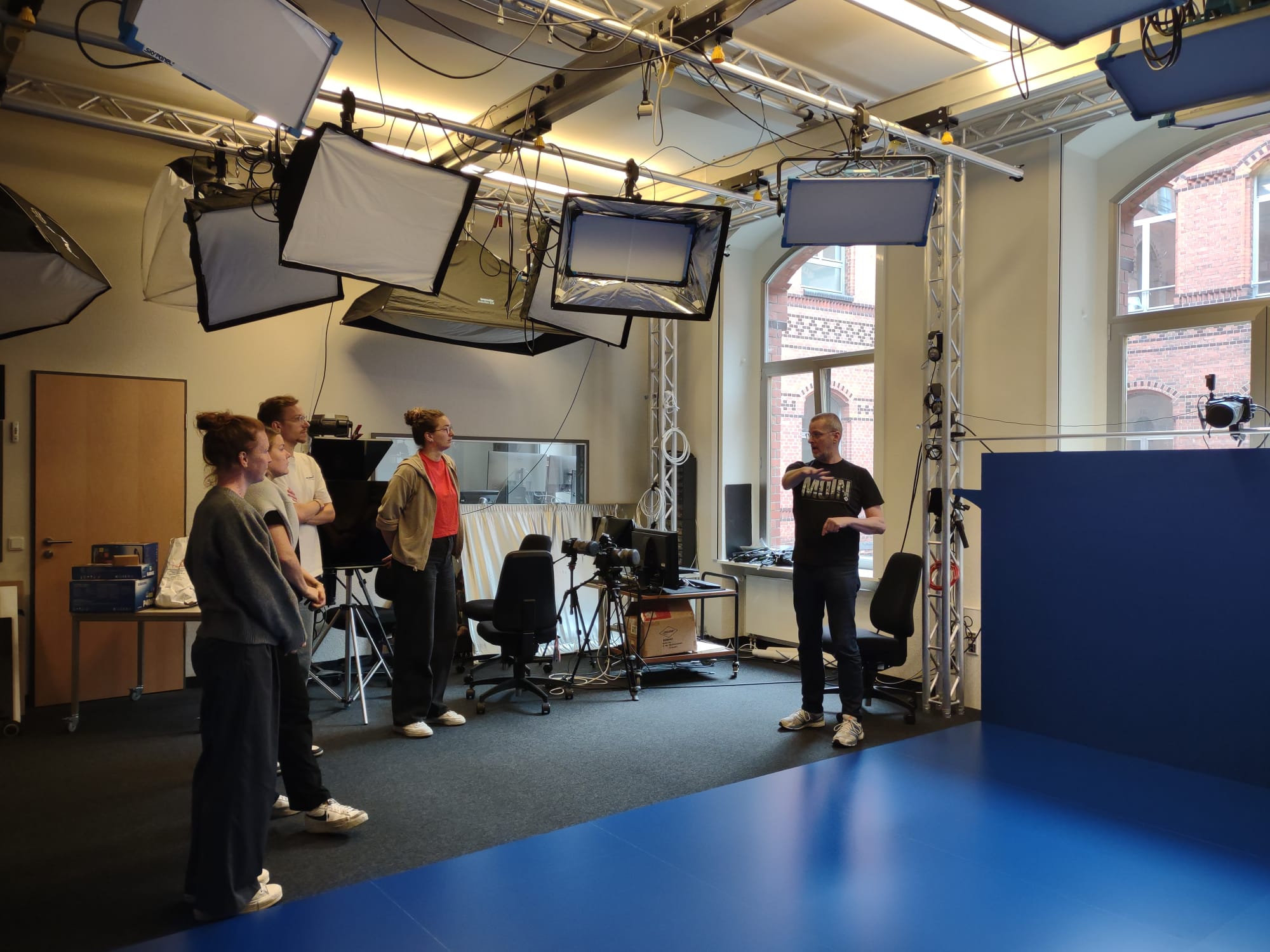
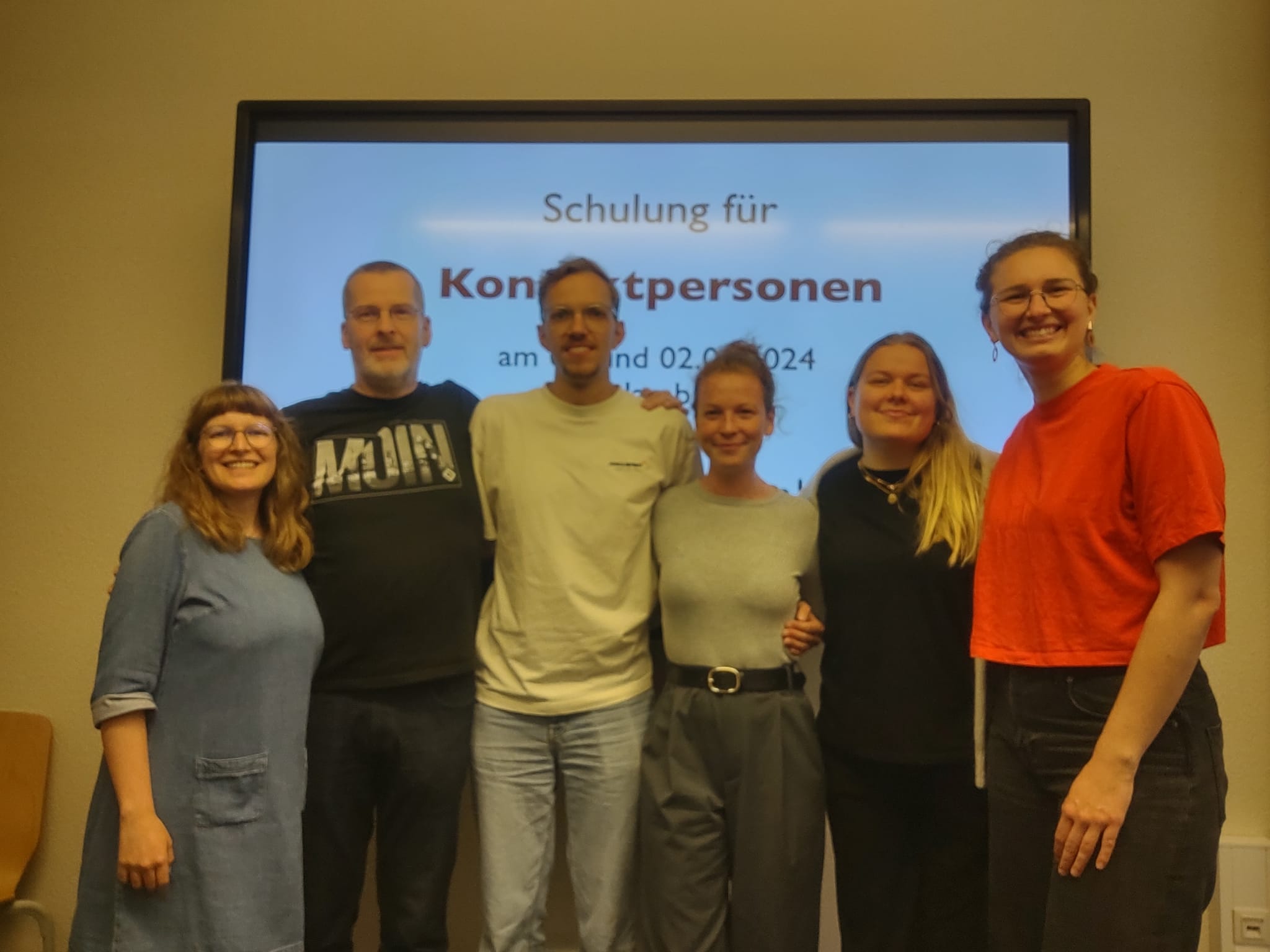
DGS-Korpus Team at the LREC-COLING 2024 in Torino
As part of LREC-COLING 2024, which took place in Turin from 20 to 25 May 2024, a workshop on sign language technologies and resources was once again held, and our team played a key role in organizing it. This year a special focus was laid on the topic “Evaluation of sign language resources”. The workshop was offered hybrid and took place on Saturday, May 25, 2024. It was held in English and International Sign.
The workshop featured four exciting presentations, three of which were presented in sign language. These included the presentation of SignBank 2.0, which was inspired by the Global Signbank and contains more visual elements. Another sign language paper presented a study on the use of Swedish Sign Language (STS) resources, focusing on the STS dictionary and the STS corpus. A team from Gallaudet University presented a position paper that critically reviewed publications on machine learning in relation to sign languages. In the last talk of the day, researchers from Japan presented their work on controlling motion capture-based avatars using HamNoSys.
Over 40 posters were presented at the workshop. Each poster was presented on stage with a 1-minute elevator pitch to give participants an impression of which topics might be of particular interest to them. The subsequent poster sessions, which were very well attended and scheduled with plenty of time, were particularly lively and varied.
The DGS corpus project was represented with a total of four posters, one of which was created in collaboration with the EASIER project. Our colleague Marc Schulder contributed to the generally positive atmosphere in Turin with his very professional and extremely entertaining moderation.
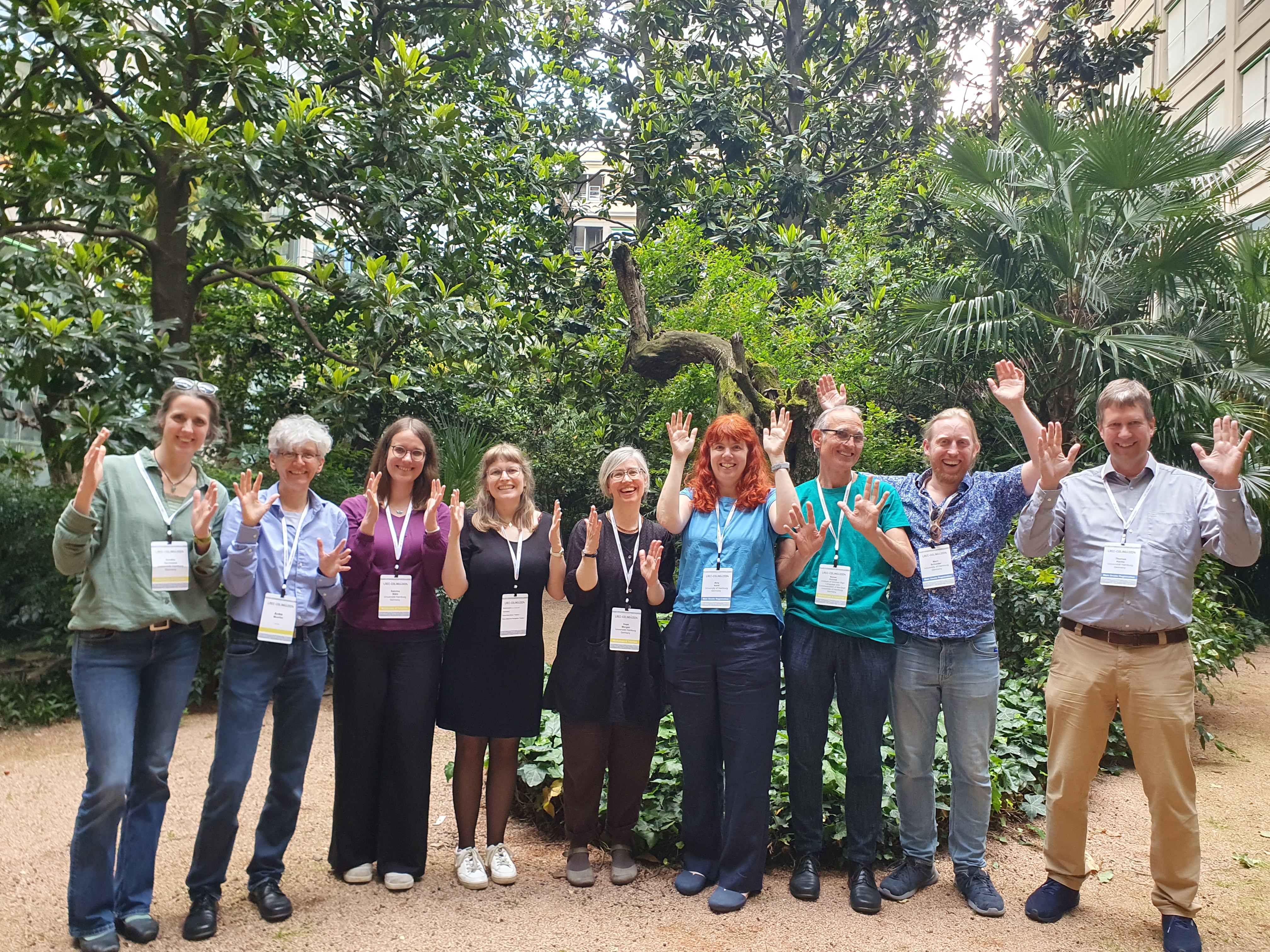
Final Meeting of the Focus Group
The final meeting of the DGS-Korpus focus group took place on March 15, 2024. On this day, the focus group met for the last time in this constellation. Together, tips were collected for the new moderators of the DGS-Korpus so that the knowledge and experiences could be passed on to the next generation. In addition, various materials were prepared for public relations work. Keep your eyes open so you don't miss any of this in the future. It was a worthy conclusion after the planned meeting in December unfortunately had to be canceled due to the railway strike.



Search for Participants
The DGS (German Sign Language)-corpus is an important resource that shows DGS and makes narratives in DGS publicly accessible. We now also want to film the DGS of younger people (data collection) and prepare it for the DGS corpus.
The next project phase of the DGS-corpus project was launched at the beginning of January 2024. The long-term project of the Academy of Sciences in Hamburg was extended by four years with a new total duration of 19 years (2009-2027). The aim of the second collection phase is to expand the data material by a fifth cohort. This will consist of young deaf sign language users (born 1993-2007) and, among other things, will provide an exciting new perspective on research into language change. We look forward to seeing many new faces!
You are young, DGS is your language and you would like to contribute to the documentation and research of DGS? Then write to us at: mitmachen2024@dgs-korpus.de
We are looking for participants aged 18-32 (born 1993-2007) for the following regions who would like to be filmed in DGS:
The DGS-Korpus Project is Being Extended!
The next project phase of the DGS corpus project was launched at the beginning of January 2024. The long-term project of the Academy of Sciences in Hamburg was extended by four years with a new total duration of 19 years (2009-2027). The aim of this project phase is to expand the data material by a fifth group. It will consist of young deaf sign language users (born 1993-2007) and, among other things, will provide an exciting new perspective on research into language change. We look forward to seeing many new faces!
You are young, DGS is your language and you would like to contribute to the documentation and research of DGS? Then write to us at: mitmachen2024@dgs-korpus.de
Search for Moderators
The DGS (German Sign Language)-corpus is an important resource that shows DGS and makes narratives in DGS publicly accessible. We now also want to film the DGS of younger people (data collection) and prepare it for the DGS-corpus.
If DGS is your language, you are well connected in the language community and have a good affiliation to young people, you can support us in the upcoming data collection in Hamburg as a moderator. We are looking for up to 10 people to help us find suitable participants from all over Germany and then guide them through the filming of the survey.
In close coordination with the research team of the DGS-corpus-project, you will promote the survey, be available to answer participants' questions and carry out the filming in the studio in Hamburg together with us. Two participants are always filmed together. You will be present as a third person during the filming and guide the participants through the recordings as a moderator. A survey day lasts approx. 5-7 hours. To ensure that everything runs smoothly and that you can carry out your tasks safely, you will receive two training sessions in Hamburg before the surveys. We will pay you a fee for your work as a contact person and moderator, as well as travel to Hamburg and accommodation.
We have divided Germany into 13 survey regions. Depending on which region you register for, you will be in our studio in Hamburg on two weekends for training and on about 3-5 dates for the survey. (If you can invest a lot of time, it is also possible to take on several regions). The surveys are planned for the period from the end of March 2024 to the end of 2025.
If you are interested or have any questions, please send an e-mail to mitmachen2024@dgs-korpus.de
If you are not interested yourself, but know suitable people, please contact them or make a suggestion as to who we can contact.
Workshop Sign-Lang@LREC 2024: Call for Papers
16.5.2020 Turin, Italy
As always, there will be a workshop on sign language technologies and resources at LREC-COLING 2024. This year's special topic is "Evaluation of Sign Language Resources". The workshop will take place on 20 May 2024 and the paper submission deadline is on 22 February 2024. Further information can be found in the official Call for Papers.
All previous publications of the workshop series can be found in the sign-lang@LREC Anthology.
The BDG e.V. Visits the IDGS, Workshop on DGS Corpus in Teaching
After the general meeting of the BDG e.V. the day before, a workshop was held on Saturday at the IDGS, this time held by Julian Bleicken from the DGS corpus project.
The general meeting was well attended. Liona Paulus from IDGS gave a warm welcome and provided updates on the institute.
Afterwards, many exciting points were discussed and voted on with Dawei Ni and Alexander Straub and others from the BDG board.
The workshop on Saturday with Julian Bleicken was very interesting. There were many different questions about how the DGS corpus project can be integrated into the work of lecturers. Julian Bleicken was able to point out many possibilities that will be further improved in terms of user-friendliness and accessibility in Release 4, i.e. the new version of the portals that will be released soon.
All in all, we hope that many of the BDG e.V. members were able to gain a good impression of the IDGS. The networking of all those involved with the IDGS will be continued.
Many thanks to the BDG e.V. for this great opportunity for exchange.
Lecture and Workshop on the DGS-Korpus Project in Göttingen
On November 25, 2023, Julian Bleicken and Annika Herrmann were guests at the University of Göttingen as part of the Signlanguage Meet-Up of the Sign Language Laboratory. They gave a lecture on the DGS corpus project and held a workshop on the Digital Dictionary of German Sign Language (DW-DGS). The sign language input and the many discussions and practical applications stimulated an interesting exchange, including snacks, sandwiches and drinks, and so there was a lot of feedback and satisfaction on all sides on the return journey.
DGS-Korpus Project at the Academy Day in Berlin
The DGS-Korpus project took part in the Academy Day on November 7, 2023 on the topic of "What is fair?" in Berlin. First, interested students took part in small course on German Sign Language and were able to learn some DGS signs and ask questions. The really exciting discussion afterwards was a real highlight of the day for us. At the project street, interested parties were able to find out more about our project, e.g. our data, the collected stories of deaf people and the digital dictionary DW-DGS (Digitales Wörterbuch DGS). Our project also took part in the panel discussion on the topic of justice in education and culture. This also explicitly highlighted the discrimination of linguistic cultural minorities.



EASIER Autumn School
Report EASIER Autumn School

Award Ceremony 'Kulturpreis Deutsche Sprache'
Award ceremony 'Kulturpreis Deutsche Sprache'
On September 30, 2023 the Kulturpreis Deutsche Sprache was awarded in Baden-Baden. The Digital Dictionary of German Sign Language (DW-DGS) won the non-endowed institutional prize.
On behalf of the entire DGS corpus team, the colleagues Gabriele Langer and Lutz König accepted the prize. They are especially pleased that the award has brought German Sign Language and its language community for a moment into the focus of public attention, because "DGS was forbidden in schools for a long time and it was a long and difficult way until DGS found recognition as an independent and full-fledged language in science and society".
The laudatory speech was given by Prof. Dr. Johannes Hennies, Professor of Education of the Deaf and Hard of Hearing at the Heidelberg University of Education.
Special thanks go to the 330 deaf participants in the DGS corpus who represent the DGS language community in the dictionary with their language and stories, and to the student assistants who tirelessly and enthusiastically support the project and thus the dictionary.
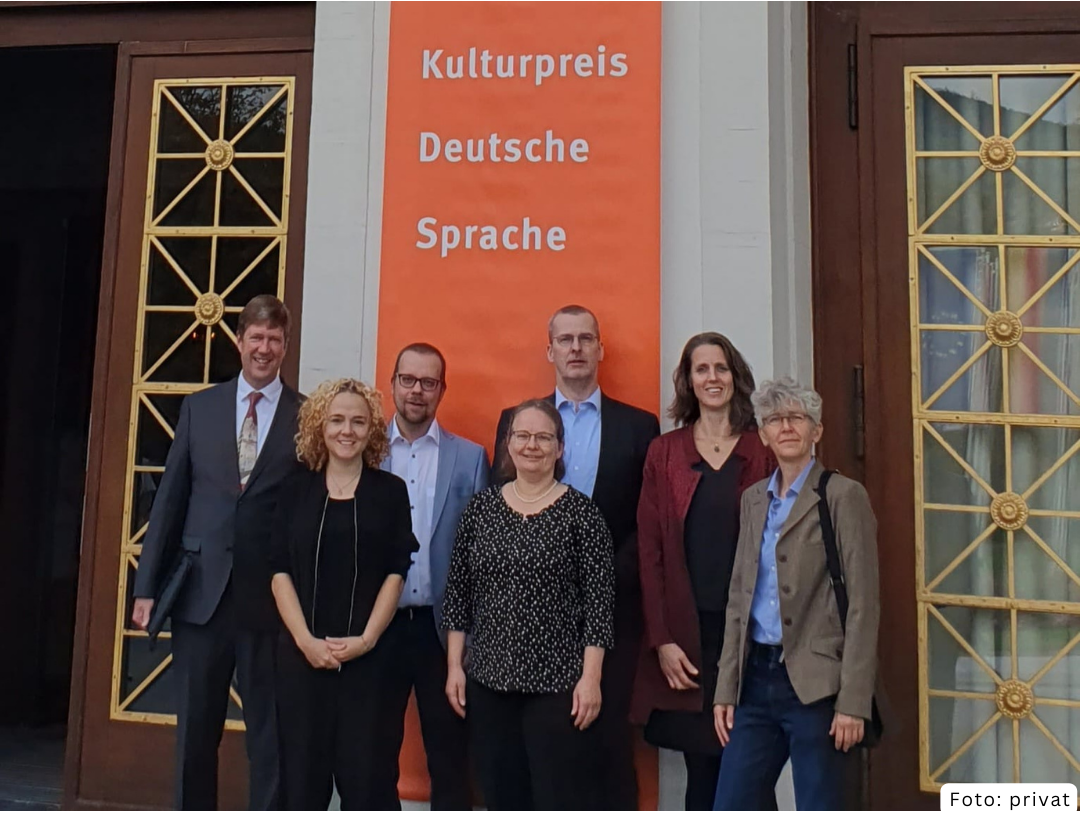
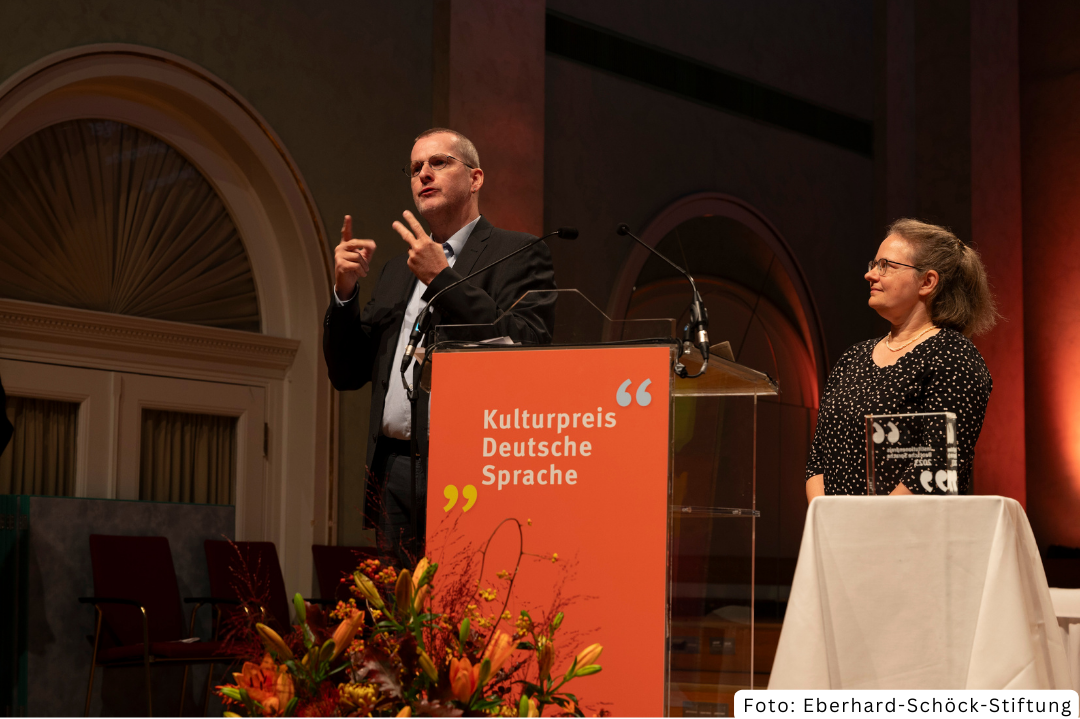
More detailed information can be found in the press releases and reports below.
DGS press release of the IDGS dated 04 July 2023.
Academy of Sciences and Humanities in Hamburg: report dated 05 October 2023.
Kulturpreis Deutsche Sprache: Report on the award ceremony of September 30, 2023.
Kulturpreis Deutsche Sprache: press release dated 03 July 2023.
Attending the Deaf Academics Conference (DAC)
Deaf Academics Conference
From September 6 to 8, 2022, our colleague Julian attended the 11th DAC in Vienna.
The DAC was a pure attendance event with about 175 participants. Germany was the most represented country with 37 participants, 17 of them from the University of Hamburg. The conference language was International Sign. This worked pretty well for Julian, in case of doubt one could always find a way around. An academic event only for the deaf was an interesting experience!
Julian had a laptop with him in addition to his poster, which he used to show the DGS corpus.
All in all, there was an exciting mix of topics: for example, it was also discussed how it is to write a doctoral thesis as a deaf person and which hurdles there are. There was something for all interests: scientific topics were strongly represented, such as STEM vocabulary for teaching, but also topics such as the rights of deaf people in court proceedings or accessibility for deafblind people.
Autumn School 2023
25-26. September in Hamburg: Sign language data meets data science – data science meets sign linguistics
Organized by: The EU EASIER project in cooperation with the DGS-Korpus project
The goal of this Autumn School is to generate expertise for under-resourced sign languages to extend the scope of EASIER to more European sign languages. The idea is not only to support people who already work with sign languages and train them in technological approaches, but also to train people who already work with in data science, language technologies, etc. in the handling of sign languages. Therefore, both groups will have a general input in the beginning on the subject that is new to them.
The subsequent sessions will discuss different topics needed to develop sign language processing, as well as a session where participants can present their own work and exchange ideas in a more flexible setting.
Workshop languages are English and International Sign.
For more detail on the courses as well as registration, please check https://www.sign-lang.uni-hamburg.de/easier/easier-autumn-school.html.
Financial Support: We also offer conference support to attend the workshop. More information can be found here: https://www.project-easier.eu/conference-support/
The Digital Dictionary Digitales Wörterbuch DGS (DW-DGS) Receives German Language Culture Award
Baden-Baden - The Digitales Wörterbuch DGS (DW-DGS), the science journalist Dr. Mai Thi Nguyen-Kim, and the German grammar school in Tallinn will be awarded the German Language Culture Award 2023 (Kulturpreis Deutsche Sprache 2023). The digital dictionary of German Sign Language ‘Digitales Wörterbuch DGS’ will receive the institutional award for its comprehensive documentation of and research on German Sign Language. The award ceremony will take place on September 30th in Baden-Baden.
Representing the everyday language use of deaf people
"We were particularly impressed by the nuanced and vivid presentation and analysis of numerous signs and their meanings," said Prof. Dr. Wolf Peter Klein, speaker of the award’s jury. The project “Digitales Wörterbuch Deutsche Gebärdensprache (DW-DGS)” (Digital Dictionary of German Sign Language (DW-DGS)) is located at the Academy of Sciences in Hamburg, at the Institute for German Sign Language and Communication of the Deaf at the University of Hamburg. It is dedicated to the documentation of and research on German Sign Language and collects sign language texts produced by deaf people and makes them available to the public. Based on this representative data, a digital dictionary is being created that reflects the everyday language of deaf people. This includes the representation of regional variation throughout Germany. The jury noted that the dictionary builds a bridge between DGS and the German language and makes it accessible to everyone.
The institutional award, which does not carry prize money, goes to institutions that have provided outstanding services to the German language.
Main Award and Initiative Award
The main award, which comes with 30,000 euros of prize money, goes to Dr. Mai Thi Nguyen-Kim. The doctor of chemistry and science journalist is best known for her YouTube channel "maiLab" and popular science books. The initiative award goes to the German grammar school in Tallinn.
The German Language Cultural Prize has been awarded annually by the Eberhard Schöck Foundation since 2001 and is awarded in cooperation with the German Academy for Language and Poetry for the first time in 2023. The main award has previously been awarded to well-known german personalities such as Udo Lindenberg, Cornelia Funke, Loriot, Ulrich Tukur and the Fantastischen Vier.
Further information about the German Language Cultural Prize can be found here. (German only)
The Digital Dictionary of German Sign Language (DW-DGS) can be found here. (German only)
The DGS-Korpus Team at the 8th SLTAT in Greece
On June 10, 2023, the 8th SLTAT (Sign Language Translation and Avatar Technology) workshop took place in Rhodes, Greece. Our team was represented there by Thomas Hanke, Sam Bigeard, Lutz König, Maria Kopf, Marc Schulder (EASIER project and DGS corpus project) and guest researcher Tsubasa Uchida (Japan). The referees presented various papers in the form of posters and lectures. The workshop was very interactive and provided numerous opportunities for international exchange. Our team presented the following publications:
"Representation Matters. The Case for Diversifying Sign Language Avatars" by Maria Kopf and co-author:s: Rehana Omardeen and Davy Van Landuyt.
"The Sign Language Interchange Format: Harmonising Sign Language Datasets for Computational Processing" by Marc Schulder, Sam Bigeard, Thomas Hanke and Maria Kopf
"EASIER Notation - A Proposal for a Gloss-based Scripting Language for Sign Language Generation Based on Lexical Data" by Thomas Hanke, Lutz König, Maria Kopf, Marc Schulder, Reiner Konrad, Rosalee Wolfe.
Tsubasa Uchida and team:
"Machine translation to sign language using post-translation replacement without placeholders" by
- Taro Miyazaki (NHK Science & Technology Research Laboratories)
- Naoki Nakatani (NHK Science & Technology Research Laboratories)
- Tsubasa Uchida (NHK Science & Technology Research Laboratories)
- Hiroyuki Kaneko (NHK Science & Technology Research Laboratories)
- Masanori Sano (NHK)
"Motion editing tool for reproducing grammatical elements of Japanese Sign Language avatar animation" von
- Tsubasa Uchida (NHK Science & Technology Research Laboratories)
- Naoki Nakatani (NHK Science & Technology Research Laboratories)
- Taro Miyazaki (NHK Science & Technology Research Laboratories)
- Hiroyuki Kaneko (NHK Science & Technology Research Laboratories)
- Masanori Sano (NHK)
IDGS Outreach in Focus: Greetings from Amsterdam
On Monday 13 February 2023, Calvin Khan and Annika Herrmann gave a presentation at SignLab Amsterdam on "Outreach in sign language research. Targeting accessible science communication". The team of Floris Roelofsen, Roland Pfau and Marloes Oomen invited us to discuss examples of outreach, accessibility and knowledge transfer in the field of sign language research. We presented PR strategies from our house, as currently developed for the DGS corpus project, examples of transfer activities of the institute as well as first analyses on different production possibilities of authentic DGS videos for social media. All participants gained a good insight into our public relations work in the context of research and teaching. After the stimulating discussion, we continued by ferry to a joint dinner in very nice company.
Guest Lecture by Julian Bleicken at the LMU Munich
On January 16th 2023 Julian Bleicken from the University of Hamburg gave a guest lecture on the "DGS Corpus Project". Despite the early morning on monday at 8 a.m., more than 20 students from the Department of Special Education with a Focus on Hearing and Communication at the Ludwig-Maximilian-University Munich were present. The students enjoyed the lecture and asked interesting questions.
DGS Corpus Data: Presentation at NELS53 in Göttingen
In their lecture "Searching for negative polarity items in DGS" on Jan. 13th, Cornelia Loos and Marc Schulder showed how they use the recordings and annotations of the DGS corpus to find negative polarity items in German Sign Language. Here they use a combination of quantitative search and qualitative analysis. The 53rd annual meeting of the North East Linguistic Society was held in Göttingen this year.
Lecture for Students: MY DGS - ANNIS
On October the 26th, Amy Isard and Reiner Konrad presented the tool ANNIS, in a hybrid event which is now available online and free of charge with sign language data from the DGS corpus as MEINE DGS - ANNIS. It can be used as an exciting search and analysis tool by students, lecturers, scientists and people interested in research data.
DGS-Korpus Project at TISLR 14 in Japan
On September 30th, the DGS-Korpus Project was live on site in Japan with a presentation at the 14th TISLR Conference. Cornelia Loos and Marc Schulder presented their work in Osaka under the title "Not just any sign! Searching for negative polarity items in DGS". They presented recent findings on potential negative polarity items in German Sign Language that they were able to identify with the help of the DGS corpus.
International Sign Language Day
Today is the International Sign Language Day. At the DGS corpus, work continues on this day to complete the DW-DGS. An example of this can be found at this link:
https://www.sign-lang.uni-hamburg.de/korpusdict/bags/bag1447.html#reading1
Conference 'Grammar and Corpora 2022' in Ghent
From June 30th to July 2nd, two colleagues from the DGS Corpus Project attended the conference 'Grammar and Corpora 2022' in Ghent, Belgium. There they gave a presentation on behalf of the lexicography group of the project on the topic of number incorporation in the DGS corpus. There was a lot of valuable feedback from other corpus linguists. Through this and another presentation, sign languages were represented in the conference program for the first time.
EURALEX 2022
Project members of the DGS Corpus Project gave a presentation at this year's EURALEX 2022 in Mannheim. The presentation ended with a stimulating discussion about the Digital DGS Dictionary. Despite the hot temperatures, the physical well-being was well taken care of. The castle was an excellent venue and there was a nice social program.
'Meet the Scientist' Talk at Humboldt Forum, Berlin
On June 30, our colleague Julian Bleicken will be presenting as part of the 'Meet the Scientist' event at the Humboldt Forum, Berlin. The presentation will cover interesting facts about the DGS-Korpus project and the DGS-media station at the Humboldt Forum, combined with anecdotes from the daily work in our project.
The presentation will be held exclusively in DGS/German. For more information, please visit the German page.
LREC Workshop on Sign Language Corpora and SLTAT 7
16.05.2020 Marseille, Frankreich
At LREC 2022 there will be another workshop on sign language technologies and resources, especially sign language corpora.
The full announcement can be found here, the deadline for submission of papers is 10.04.2022.
The LREC will also be followed by the SLTAT 7 workshop (Seventh International Workshop on Sign Language Translation and Avatar Technology: The Junction of the Visual and the Textual).
For both workshops, papers can be submitted until 10.04.2022.
New LaTeX Package to Write HamNoSys
Our colleague Marc Schulder created a package to write HamNoSys in a LaTeX document. You can find the package on CTAN and GitHub. For instructions how to install and use it, see the new project note AP04-2021-02.
For maximum flexibility the package offers three input methods:
- Enter HamNoSys symbols directly (good for copy-pasting symbols from elsewhere)
- Use commands for each symbol
- Write a list of symbol names (e.g. with the HamNoSys input palette)
There are new versions of the Input Keyboard (App) and the Web Input Keyboard that simplify copying between TeX documents and the palette (and make the hand shape drawings available in copyable form).
News Report about our DGS Media Station
It is an informative article, where you can also see photos of the media station.
The (German only) article can be found here.
"Specials" at MEINE-DGS.de
On the website MEINE-DGS.de there is now a new collection, "Specials".
This collection features topic-specific social media posts, such as posts about the...
- Fall of the Berlin Wall anniversary
- Anniversary of the death of Gunter Trube
- Trabbi
- International Women's Day
- ... and many more topics.
The Special Movies can be found here: http://meine-dgs.de/extras/specials.html
The videos in this collection are clickable, behind them you will find transcripts from the Public DGS Corpus that match the respective topics.
We hope you enjoy browsing!
An overview of European sign languages
Our sister project EASIER has published an overview of existing datasets of European sign languages. The document describes 26 corpora and 41 lexical resources, as well as 26 commonly used data collection tasks. The DGS corpus and its type list are also represented, of course!
The document can be found here: https://doi.org/10.25592/uhhfdm.9561
Each entry includes a brief description of the resource as well as a table containing key facts, such as languages represented, size of collection, demographics of participants, type of linguistic information, and information on access and licensing terms.
An impressive amount of data and a good overview for researchers!
EASIER is a Horizon 2020 project that aims to design, develop, and validate a complete multilingual machine translation system that will act as a framework for barrier-free communication among deaf and hearing individuals, as well as provide a platform to support sign language content creation.
"Mrs. Serious Face" - Article in SPIEGEL
"Around 80,000 people in Germany use sign language. Regionally, there are major differences. A researcher now wants to collect all dialects - and keeps experiencing surprises."
On June 25, 2021, an article was published in the German magazine SPIEGEL in which our colleague Lutz König also has his say. He was interviewed for the article - the interview took place online, of course, as so many things do at the moment.
Meeting with the focus group 18/25.06.2021
Meetings with the focus group were held on the 18th and 25th of June 2021. Again, there were many interesting discussions. About what, a member of the focus group shares in the video below!
The focus group are deaf experts who support us with their DGS knowledge. More about the focus group can be found on the website here:
Thank you for your video report, Thomas!
Meeting with the focus group
A meeting with the focus group was held last Friday, 6/18/2021, in very summerlike temperatures. As always, it was productive and exciting.
There is also a new member in the focus group: Welcome, Harro! We are happy to have you join us!
This Friday we will continue with the next meeting.
Teacher training by our focus group
On June 13, 2021, a member of the focus group presented the preliminary entries in DW-DGS, the Digital Dictionary DGS - German, to DGS lecturers in Munich. She collected many questions and feedback and passed them on to us.
All in all, the preliminary entries were very well received, especially the depth of detail of the entries was complimented.
If you want to take a look at the DW-DGS yourself, you can find it here.
Please note, that this is not the final version, but preliminary entries. Especially the layout and the search functions are still being worked on. Nevertheless it is worth to have a look! And of course we always welcome feedback!
Congratulations on the 15th anniversary of the Academy of Sciences in Hamburg!
On the occasion of its 15th anniversary, the Academy of Sciences in Hamburg has published a brochure in which the DGS-Korpus project is also mentioned.
The (German) brochure can be found here.
The DGS-Korpus project congratulates the Academy of Sciences in Hamburg on its 15th anniversary!
DGS-Korpus at Instagram
The DGS Corpus Project now has an Instagram account!
We are very happy and excited about this new channel.
You can find us at: dgs-korpus-projekt
(Content on our Instagram will be in DGS and German.)
Advent Calendar
The DGS-Korpus team wishes you a happy 1st December!
From today on in our advent calendar each day a new door can be opened.
Click here for the calendar.
Meetings with the Deaf advisory board
Meetings with the Deaf advisory board were held again on November 14/15, 2020. Of course it was not a personal meeting, all participants participated from home. The meeting took place via Zoom and there was a lively exchange on various topics, including the preliminary entries of the DW-DGS, the Digital Dictionary of German Sign Language - German.
First preliminary entries of the 'Digitales Wörterbuch der Deutschen Gebärdensprache', our corpus-based dictionary, are online
We, the DGS-Korpus team, have recently announced a new version of our Public DGS Corpus. Now there are even more news!
There is finally a first insight into the Digitale Wörterbuch der Deutschen Gebärdensprache, to be precise: the korpusbasierte Wörterbuch Deutsche Gebärdensprache – Deutsch. Abbreviated: DW-DGS.
We invite you to have a look at the first preliminary entries of the upcoming dictionary that are published in advance.
Please note that this is not yet the finished dictionary. It is a preview. Therefore only a few entries are available here as a preliminary view. More entries will be published online over time.
Both the contents and the structure of the dictionary are still being worked on. For example, later, in the finished dictionary, there will be the possibility to search for sign forms. The layout of the finished dictionary might also change.
The first preliminary entries can be found at dw-dgs.de.
Greetings from our home offices!
The DGS-Korpus team sends its best wishes from the home offices! In spite of Corona and the difficult conditions, the work continues, as do our regular meetings. The difference is that at the moment we meet via video chat, as can be seen on the photos. One picture gives a small insight into our weekly corpus meetings with the project staff, the other picture shows one of the regular meetings with our student co-workers. In the beginning, it took a bit of time to get everything set and running, but in the meantime the video meetings are working really well.
DGS-Korpus meeting with the project staff. Picture: DGS-Korpus
Meeting with our student co-workers. Picture: DGS-Korpus
Talk about the DGS-Korpus project in South Korea
On 04.07.2020 the former project collaborator Dr. Sung-Eun Hong gave a talk about the DGS-Korpus project at Kangnam University in South Korea. The talk took place in the context of a conference on the current and future research situation of regional variants in sign languages.
Despite corona protection measures, about 80 participants were on site. Due to the current situation, the participants wore masks and were sitting at a great distance from their neighbours. Only the lecturers and the interpreters did not have to wear masks.
The lecture was followed with great interest. Questions from the audience concerned the size of the DGS corpus, the development of the dictionary based on the corpus as well as the handling of mouthings and finger alphabet. We thank Dr. Sung-Eun Hong for presenting the DGS-Korpus project on this stage.
picture: Kang-Suk Byun
Announcement: Release 3 of the Public DGS Corpus
At the moment we are working in home office due to Corona, but the work continues there as well.
Now we have news for you!
There is a new version of the Public DGS Corpus: Release 3!
Especially on the portal for researchers, "MY DGS - annotated", there is much new content to discover. We have also made a few corrections.
New is, for example, the possibility to view the individual signs in context. If you click on a type in the types list, all occurrences of this type will be shown - together with some signs before and after.
In addition, some types entries now contain links to other resources, e.g. to already existing entries in the Digital Dictionary DGS-German or in the "Fachgebärden-Lexika".
There are many more innovations. Take a look.
How? The addresses are the same, of course:
MY DGS: http://meine-dgs.de
MY DGS - annotated: http://ling.meine-dgs.de
Have fun looking at it!
Welcome to our new colleagues!
The DGS-Korpus team would like to welcome its new staff members Calvin Khan, Dr. Cornelia Loos and Felicitas Otte: Welcome to the DGS-Korpus Project!
600000 Token Tags in the DGS corpus
Even in difficult times the work in the DGS-Korpus project goes on: On March 16, 2020 the 600000th token tag was created by a student assistant, a reason to cheer!
In these extraordinary times, the DGS-Korpus team wishes everyone a lot of strength and good health!
New articles in press regarding the DGS-Korpus project
The new year starts with two new articles regarding the DGS-Korpus project. The articles, available only in German, can be found here: Ein elektronischer Duden für Gehörlose, Ein Wörterbuch für Gebärdensprache
Talk by Michael Meyer in Dortmund
At the 13th of December 2019 Michael Meyer gave a talk about the DGS-Korpus project. He presented the Public DGS Corpus and also gave an outlook on the dictionary DGS-German. After the talk, the program "SignHunter" was used to collect signs for places.
More information on the Public DGS Corpus can be found here.
Summer School 2019
From September 30 to October 4, the long term projects DGS-Korpus and INEL (both funded by the Academy of Sciences and Humanities in Hamburg) organised a summer school on language documentation and corpus technology in cooperation with the EU project SignHub. The summer school had 45 participants from all over the world. 10 half day courses offered information on basic topics such as quality assurance, grammar documentation and lexicography of non-written languages as well as on current trends such as publishing corpus data, data life cycle and computer vision. The morning courses provided input from a cross-modal perspective whereas the afternoon courses went into detail with either a spoken language or a signed language perspective. In addition, two evening lectures shed light on the interface between spoken and signed language documentation.
The five days were exhausting on the one side, both for the participants and the organisers, but on the other side were also a splendid opportunity for in-depth exchange.
Public DGS Corpus Release 2
The Public DGS Corpus Release 2 is now available. A couple of new videos has been added, completing the targeted size of 50 hours. For scientific use, we now provide OpenPose data for the published movies. In addition, we now provide DOIs to identify transcripts when citing them in papers. You find the portal for the language community at http://meine-dgs.de and the portal for research at http://ling.meine-dgs.de.
Workshop Form-Meaning-Units in Nijmegen, 3.-4.6.2019
Early in June the DGS-Korpus Project was presenting at the “Form-Meaning Units” Workshop. The same-named project at the Radboud University in Nijmegen (Netherlands) invited about 20 researchers of sign and vocal languages to discuss the issue of whether there is a common definition of the minimal linguistic units and how to describe their structure and functions.
DGS-Korpus team gave a presentation in Lund, Sweden
From May 3-5 a group of the DGS-Korpus team (Anke Müller, Reiner Konrad, Gabriele Langer, Sabrina Wähl) attended the international conference “Iconicity in Language and Literature, ILL-12” in Lund. Gabriele and Sabrina gave a presentation about the iconic motivation that underlies conventional DGS-signs, the title was: “Where Frozen Signs Reclaim Iconic Ground – Iconic Modification in German Sign Language (DGS)".
New videos online on MY DGS! Research portal with videos and annotations now available online!
We have some important news for you!
- There are many new videos available online on MY DGS!
- We recently published the website "MY DGS - annotated" on which you can find videos of DGS with annotations. Feel free to take a look and explore the page! The portal is especially well suited for scientific purposes.
Please keep in mind that these two amazing pages are not to be confused with the publication of the dictionary! Over the next few years, we will gradually release the electronic dictionary of DGS step by step.
For more detailed information please visit the DGS-Korpus homepage via Public Corpus.
MY DGS can be directly accessed via: http://meine-dgs.de, MY DGS - annotated via http://ling.meine-dgs.de.
We as the publishers of these sites extend a warm welcome to all members of our sign language community and to everyone who is interested in learning more about DGS. We are looking forward to your feedback!
DGS-Korpus team at the SignNonmanuals 2 - International Workshop in Graz
DGS-Korpus team at the SIGN Conference in Poland
From August 22nd – 25th the DGS-Korpus team participated with a team of two colleagues at the SIGN9 conference in Warsaw, Poland. The SIGN conference takes place on a regular base at various locations. It focuses on the issues of Deaf people, their language and culture and represents countries from all over the world. Satu Worseck gave a presentation “DGS-Korpus Online“ in International Sign. The public DGS Corpus will be published soon.
The DGS-Korpus project at EURALEX 2018
This year’s EURALEX took place in Ljubljana, SI from July 17th to July 21st. For the first time, it dedicated a whole session to Sign Language Lexicography. The DGS-Korpus project participated with a presentation on “Authentic Examples in a Corpus-Based Sign Language Dictionary - Why and How”. The corresponding paper is available in the publication of the EURALEX proceedings:
Langer, Gabriele / Müller, Anke / Wähl, Sabrina / Bleicken, Julian (2018). "Authentic Examples in a Corpus-Based Sign Language Dictionary – Why and How". In Čibej, Jaka, Gorjanc, Vojko, Kosem, Iztok & Krek, Simon (eds.). Proceedings of the XVIII EURALEX International Congress: Lexicography in Global Contexts. Ljubljana: Ljubljana University Press, Faculty of Arts, S. 483—497. Online: https://e-knjige.ff.uni-lj.si/znanstvena-zalozba/catalog/view/118/211/2933-1.pdf
Proceedings for the LREC Workshop on Sign Language Corpora: Involving the Language Community are online
You can find the proceedings at http://www.sign-lang.uni-hamburg.de/lrec2018/programme.html
Promotion video available with English subtitles
The video clip about the DGS-Korpus project, produced by the Hamburg Academy of Sciences, is now also available with English subtitles. The subtitles can be selected from the video control element.
English pages available in International Sign
The main pages explaning the project and its background as well as possible usages of a corpus, are now fully available in International Sign. Thank you, Dawei Ni, for your good work!
First meeting of Deaf advisory board
On June 1st, 2013 the newly founded Deaf advisory board met for the first time.
The Deaf advisory board consists of 11 people from different regions in Germany. They represent the sign language community and facilitate communication between the projekt team and the Deaf community. They also help to handle regional characteristics in language use within the linguistic analysis. Also, they comment on signs and deal with special problems and questions we have.
At this first meeting we dealt with the online-feedback which is due to start this year. The members of the advisory board critically tested the system and gave valuable feedback on various areas concerning the system. We also discussed the topic of German signs and their equivalents in written German for the basic vocabulay of DGS, which is to be published at the end of 2014. We had quite a full day, but nonetheless the atmosphere was cheerful and productive.
We are looking forward to working with so many committed and motivated people!
Pictures of the event can be found here.
DGS-Korpus project at the 5th Cultural Days of the Deaf (Kulturtage) in Erfurt
The DGS-Korpus project will have its own booth as well as a presentation at the Deaf Culture Days in Erfurt (Sept 20-22, 2012).
For more information on this important Deaf event, please click here.
Summer School 2012
Two weeks of theory and hands on training concerning corpus linguistics of sign languages
High-speed video recordings available
Data Collection Completed
Our mobile studio was built up at 12 locations all over Germany, 22 contact persons were busy for the project in order to film 330 informants and collect more than 400 hours of signing!
This phase is now completed und we are now looking forward to transcribing and analysing the data collected.
Thanks a lot to all informants and everybody involved. Without you this would not have been possible!

Photos from "Nacht des Wissens" in Hamburg
The fourth "Nacht des Wissens" (Science Night) took place in Hamburg on 29th October 2011 from 5 pm to midnight. The DGS-Corpus project and other projects and activities of the Institute for German Sign Language presented the "visual world of sign language".
The visitors had the chance to see films from the DGS-Corpus project and also themselves on a screen in 3D, which was especially exciting for children. Furthermore the automatical sign recognition from the DictaSign project could be tried out. A sig n-avatar could be controlled with HamNoSys notation that was entered by the visitors. The project DeLeGS took part with a quiz in writing signs and showed an editor for wri ting signs that visitors also could try out. Furthermore well frequented trial lessons in DGS were offered as well as aplenty of information about sign language.
Press release, 28 october 2008
Long-term project by the Academy of Sciences in Hamburg
In January 2009 a long-term project of the Academy of Sciences for the development of a corpus-based, electronic dictionary for German Sign Language (DGS) - German starts. The 15 year long project will be sponsored by the Academy with 8.5 million Euros and will be carried out at the Institute for German Sign Language and Communication of the Deaf at the University of Hamburg. It is a milestone in the research of DGS. The project will be supervised by Prof. Siegmund Prillwitz and Prof. Christian Rathmann.
The project connects two goals: First, the collection and analysis of sign language data in an annotated corpus and second, the development of an electronic dictionary DGS - German. The corpus contains a few hundred hours of video which will be recorded from about 250 Deafs allover Germany and afterwards systematically processed and analysed in a special database. This sign language corpus is comparable to large corpora of spoken languages. It will not only be the basis of a linguistically verified development of a DGS-dictionary. It also offers future possibilities for the empiric research of DGS with respect to its grammar, structure of meaning and usage. The dictionary will contain about 6000 entries. Due to the lexical structure of sign languages this corresponds to a multiple of entries in spoken language dictionaries. The selection of entries will rely on the actual usage of gestures by the way they are documented in the corpus. In this approach the sign language vocabulary can be captured and represented better than when coming from a german wordlist. The future electronic dictionary will present the signs as movies and will offer more differentiated access-, search- and display (e.g. search after a form of sign) options than a book.
The sign languages of the Deaf have developed in national and regional communities of Deaf as natural languages. The traditional education of the Deaf concentrated on spoken languages until the second half of the 20th century and devalued sign languages as simple non-language gesticulation. Also from a scientific point of view sign languages have not been considered an object of research. This deprecative attitude changed in Germany just about a decade ago. Today Deafs are accepted as members of a language minority and their sign language gets more and more usage in education, work and everyday life.
The corpus-based liguistic fundamental research of DGS is currently under development. But it is the precondition for the development of teaching and learning materials as well as substantiated usage of DGS especially in the field of teaching sign language in schools. In this connection the new project has an outstanding meaning.
For the speech community of sign language users the development of a DGS-dictionary has furthermore a high intangible value and contributes to the documentation as well as to the further acceptance of their language in the society. The speech community is involved in the development of the corpus right from the beginning and can take part in an internet-based review. A selected group of native signers from several regions in Germany is also involved in the analysis.
Target audience of the dictionary are learners native in german (e.g. parents and teachers of Deaf children), professional sign language interpreters, native Deaf DGS-users (Deaf adults, children of Deaf adults, Deaf children and children who learn DGS as first language), sign language teachers, linguists, and liguistic typologists. To cope with the different interests in usage of the different groups we plan to do a survey about the needs and wishes among the potential user group. As the dictionary is supposed to be used in different learning situations as well as translation contexts it is bilingual and offers access to the content in both languages, DGS and German. The project will be carried out in close international cooperation with leading institutes for sign language research especially in Europe, the USA and Australia.
The Academy of Sciences in Hamburg
The Academy of Sciences in Hamburg, found in 2004, has outstanding scientific members from all fields from allover Northern Germany. As a working academy it will contribute to intensify the cooperation of different fields, academies and other scietific institutions. It supports research on socially meaningful issues of the future and scientific fundamental research. As a special task it wants to encourage the dialogue between science and public. As a public corporation the Academy is financed by the free and hanseatic city of Hamburg. The Academy of Sciences is a member of the academy union that coordinates the academy programme which is financed by the federal government and the federal states (Länder). This project is financed by funds of the academy programme.
